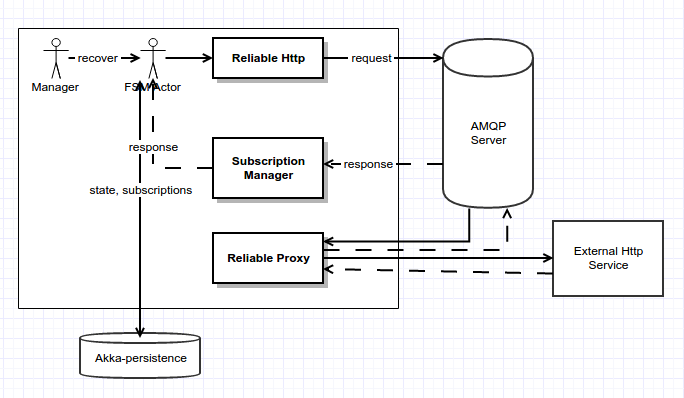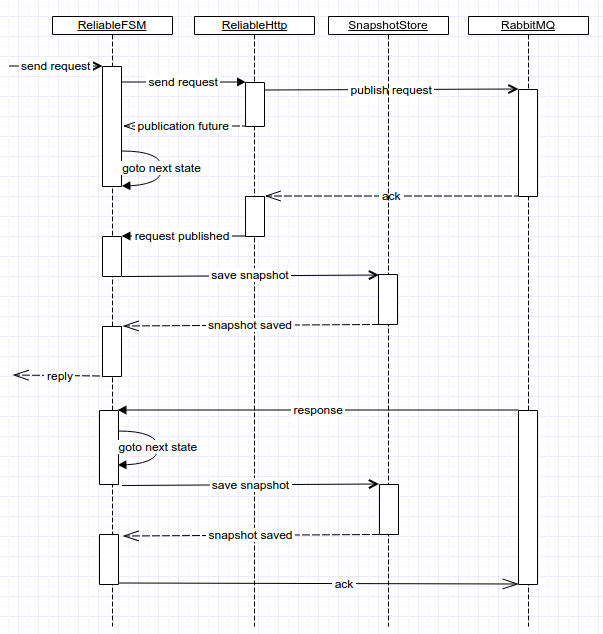Reliable Http Client is a set of tools making HTTP communication more reliable. It supports: at least one delivery guaranty and retry strategies including durable exponential backoff and dead letter queue.
It abstracting from publisher/subscriber transport. Currently there are implemented AMQP transport and Json4s serialization modules.
It can be used with any HTTP client. It includes wrapper for Akka HTTP in separate module, but You can use it with your own. In fact, it can be used with any request/response client, not necessarily HTTP.
There are 3 basic usage scenarios:
- in-only: when You are not interested in response, You only want to make sure that request was delivered
- in-out: when You are interested in response but your response consumer is stateless
- in-out with subscriptions for response: when You are interested in response and your response consumer is stateful
For the third scenario there is also provided module with persistent Akka FSM Actors (using akka-persistence) for easy recovery of subscriptions for responses.
If You only want to use Akka wrapper for amqp-client with Json4s serialization
libraryDependencies += "org.rhttpc" %% "rhttpc-amqp" % "0.8.0"
libraryDependencies += "org.rhttpc" %% "rhttpc-json4s" % "0.8.0"Than:
import akka.actor._
import rhttpc.transport.amqp._
import rhttpc.transport.json4s._
import rhttpc.transport.json4s.CommonFormats._
implicit val actorSystem = ActorSystem()
import actorSystem.dispatcher
AmqpConnectionFactory.connect(actorSystem).map { connection =>
val transport = AmqpTransport(connection)
val publisher = transport.publisher[String]("foo-queue")
publisher.publish("foo-message")
val subscriber = transport.subscriber[Int]("bar-queue", actorSystem.actorOf(Props(new Actor {
def receive: Receive = {
case i: Int => println(s"got: $i")
}
})))
subscriber.run()
}For using of client with AMQP transport and Json4s serialization
libraryDependencies += "org.rhttpc" %% "rhttpc-amqp" % "0.8.0"
libraryDependencies += "org.rhttpc" %% "rhttpc-json4s" % "0.8.0"
libraryDependencies += "org.rhttpc" %% "rhttpc-client" % "0.8.0"import akka.actor._
import rhttpc.transport.amqp._
import rhttpc.transport.json4s._
import rhttpc.transport.json4s.CommonFormats._
import rhttpc.client._
implicit val actorSystem = ActorSystem()
import actorSystem.dispatcher
AmqpConnectionFactory.connect(actorSystem).map { implicit connection =>
val client = ReliableClientFactory().inOnly[String](ownClient.send)
client.send("foo")
}import akka.actor._
import rhttpc.transport.amqp._
import rhttpc.transport.json4s._
import rhttpc.transport.json4s.CommonFormats._
import rhttpc.client._
implicit val actorSystem = ActorSystem()
import actorSystem.dispatcher
AmqpConnectionFactory.connect(actorSystem).map { implicit connection =>
val client = ReliableClientFactory().inOut[String, String](
send = ownClient.send,
handleResponse = consumer.consume
)
client.send("foo")
}Consinder situation:
system.actorOf(Props(new Actor {
def receive = {
case DoJob =>
httpClient.send(request) pipeTo self
case Response =>
// handle respone
}
}))When given actor will be shutdowned e.g. because of a system failure, the response message will never been delivered.
Thanks to rhttpc the same execution cause that actor after restart will got the response message.
val rhttpc = ReliableHttpClientFactory().inOutWithSubscriptions(amqpConnection)
system.actorOf(Props(new Actor {
def receive = {
case DoJob =>
val request = HttpRequest().withUri("http://ws-host:port").withMethod(HttpMethods.POST).withEntity(msg)
rhttpc.send(request).toFuture pipeTo self
case Response =>
// handle respone
}
}))The example above cause that request/response will be send through AMQP durable queues. If http service idle for a while and during this we need to restart our app, response message will be delivered to response AMQP durable queue. But after restart our application won't know what to do with response - in which state was sending actor. So we need to also persist state of our actor including acknowledged published requests. It can be achived by ReliableFSM delivered by this project.
val rhttpc = ReliableHttpClientFactory().inOutWithSubscriptions(amqpConnection)
system.actorOf(Props(new FooBarActor(rhttpc)), "app-foobar")
class FooBarActor(rhttpc: InOutReliableHttpClient) extends ReliableFSM[FooBarState, FooBarData] {
import context.dispatcher
override protected val id = "foobar"
override protected val persistenceCategory = "app"
override protected val subscriptionManager = rhttpc.subscriptionManager
startWith(InitState, EmptyData)
when(InitState) {
case Event(SendMsg(msg), _) =>
val request = HttpRequest().withUri("http://ws-host:port").withMethod(HttpMethods.POST).withEntity(msg)
rhttpc.send(request) pipeTo this
goto(WaitingForResponseState) replyingAfterSave()
}
when(WaitingForResponseState) {
case Event(httpResponse: HttpResponse, _) =>
self forward httpResponse.entity.asInstanceOf[HttpEntity.Strict].data.utf8String
stay()
case Event("foo", _) => goto(FooState) acknowledgingAfterSave()
case Event("bar", _) => goto(BarState) acknowledgingAfterSave()
}
when(FooState, stateTimeout = 5 minutes) {
case Event(StateTimeout, _) => stop()
}
when(BarState, stateTimeout = 5 minutes) {
case Event(StateTimeout, _) => stop()
}
whenUnhandled {
case Event(CurrentState, _) =>
sender() ! stateName
stay()
}
}Slightly difference is that instead of rhttpc.send(request).toFuture pipeTo self we are doing rhttpc.send(request) pipeTo this. Also our actor extends ReliableFSM which handles messages from queues and persist actor's state. If our application was shutdowned in WaitingForResponseState, after restart actor will recover their state and handle response. Full example you can check out here. There are also Docker tests that reproduce this situation. All you need to run them is installed Docker. If you have one, just run sbt testProj/test 2>&1 | tee test.log
Proxy can be also run as separate process.
rhttpc uses
- rabbitmq-client for communication through AMQP
- json4s for serialization
- akka-http for HTTP communication
- akka-persistence for storing snapshots of FSM states
The reliable-http-client is released under version 2.0 of the Apache License.

